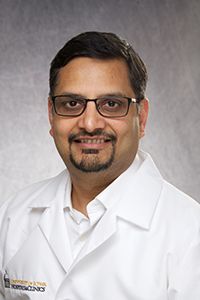Article
The Human Gut: The Next Frontier for MS Therapies
Author(s):
New research suggests microbe-based treatments could be available in the next 5 to 10 years.

The next important therapy for patients with multiple sclerosis (MS), might not be a drug — it might be a microbe.
That’s one possibility raised by new research into the human gut by researchers at the University of Iowa and the Mayo Clinic.
The scientists looked at a sampling of three gut microbes in a mouse model of MS. They found that 1 of the 3 — Prevotella histicola — was able to suppress immune disease.
Ashutosh Mangalam, PhD (pictured), assistant professor of pathology at the University of Iowa’s Carver College of Medicine, said the research is still very early but could prove important.
“Our study will provide the groundwork for future studies to test microbe-based therapies directly in the patients,” Mangalam said. “At this stage, we are actively working with our Mayo colleagues to explore the possibility of testing microbe-based therapies for patients with autoimmune diseases, especially multiple sclerosis, rheumatoid arthritis, and type 1 diabetes.”
Mangalam led a study published last year that found patients with MS have a distinct microbiota from healthy peers. Specifically, he found patients with MS had lower levels of “good” bacteria, such as that found in foods like soybeans and flaxseed.
In the new study, Mangalam and colleagues found that when P. histicola was introduced into mouse models, it led to a decrease of pro-inflammatory Th1 and Th17 cells, while at the same time increasing disease-fighting T-cells, tolerogenic dendritic cells, and suppressive macrophages.
“Our study shows that a human commensal from the upper gastrointestinal tract possesses potent disease-protective characteristics and provides proof of principle that human commensal gut bacteria protect against neuroinflammation,” researchers wrote.
Mangalam cautioned against hasty conclusions. He noted that the safety and efficacy of these microbes still need to be tested in humans. But, if his hypothesis proves correct, microbe-based treatments could be available in the next 5 to 10 years.
The research also raises the possibility of one day predicting or preventing MS based on gut microbiota testing. In order for that to happen, Mangalam said scientists first need larger studies that can help establish a baseline for a “normal” gut microbiota.
He also said scientists need a better understanding of the different roles bacteria perform, or can perform, in individuals.
“We also have to remember that the gut microbiota analysis is the study of a community where different kinds of bacteria are needed to perform certain kinds of functions,” he said, comparing it to a city, where individuals chefs, mechanics, tailors -- each have different specialties.
“Similarly, a healthy individual needs a diverse bacterial population, which will perform different kinds of functions, e.g. metabolizing plant-based metabolites such as fibers into short chain fatty acids (SCFA), and isoflavone/lignans into equol/enterolactone, etcetera,” Mangalam said. “What we need to understand better is which bacteria can do similar kinds of functions because different individuals might use different bacteria to perform same function such as production of SCFA from fibers.”
Mangalam said building out a better catalog of bacteria functions will help identify the potential for disease in patients.
The study, "Human Gut-Derived Commensal Bacteria Suppress CNS Inflammatory and Demyelinating Disease," was published online in Cell Reports this month.
Related Coverage
Study Highlights Promise, Questions in Quest for Stem Cell-based MS Treatments
New Images of Brain Receptor Could Lead to MS Therapy Breakthroughs
Multiple Sclerosis Treatment is Focus of New Value-Based Payment Pilot




